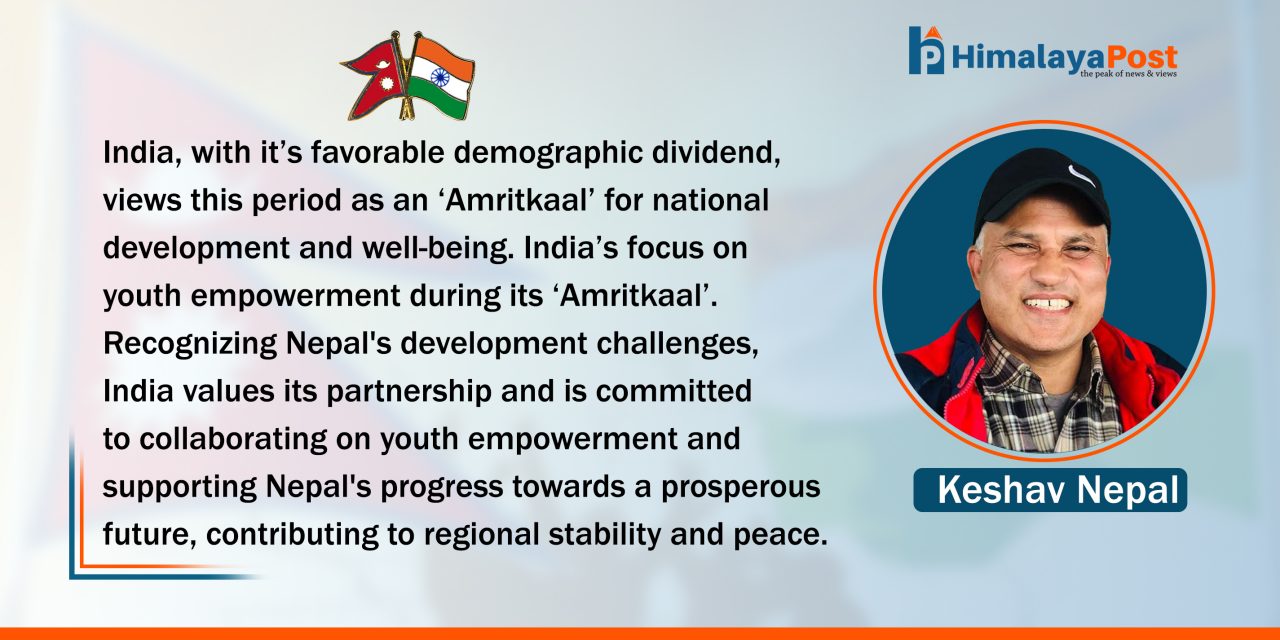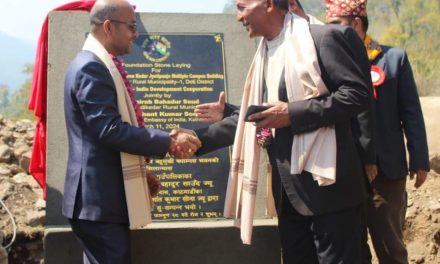– Keshav Nepal
India, often celebrated as a youthful nation, is home to one of the largest youth populations globally, with over 600 million individuals under the age of 25. This demographic dividend presents a transformative opportunity to drive economic growth, foster innovation, and promote holistic social development. However, it also underscores the responsibility of ensuring equitable access to quality education, skill development, and meaningful employment opportunities. To harness this potential, India has launched a series of forward-looking initiatives, such as Skill India and Startup India, designed to equip its youth with the competencies needed to thrive in an increasingly dynamic global economy.
In a spirit of regional solidarity and shared progress, India has extended its youth empowerment efforts beyond its borders, with a particular focus on its neighbor, Nepal. A cornerstone of this collaboration is India’s comprehensive scholarship program for Nepalese students, which not only promotes academic excellence but also strengthens the cultural and economic ties between the two nations. Complementing this, India has supported Nepal through skill development initiatives, infrastructure projects, and economic assistance, reflecting a shared vision for regional stability and cooperation.
While Nepal is endowed with a rich cultural heritage and abundant natural resources, it faces developmental challenges in areas such as governance, infrastructure, and human capital development. Through India’s steadfast collaboration, Nepalese youth are being empowered to drive their country’s journey toward modernization and sustainable progress. This partnership underscores India’s commitment to fostering mutual growth and shared prosperity in the region.
Initiatives to Empower and Skill India’s Youth
Skill India Mission:
Launched in 2015, the Skill India Mission aims to provide vocational training and skill development to over 400 million individuals by 2022. Through programs like the Pradhan Mantri Kaushal Vikas Yojana (PMKVY), the initiative focuses on enhancing employability across sectors such as manufacturing, services, and agriculture.
Start-Up India:
Introduced in 2016, this initiative fosters a culture of entrepreneurship by offering financial support, mentorship, and regulatory ease to start-ups. It includes tax exemptions, access to a dedicated fund of INR 10,000 crore, and simplified compliance frameworks.
Make in India:
Launched in 2014, this program aims to transform India into a global manufacturing hub by promoting domestic production and attracting foreign investment. It focuses on 25 key sectors, including automobiles, textiles, and electronics, while providing skill development training to meet industry demands.
Digital India:
This initiative, launched in 2015, seeks to create a digitally empowered society by providing digital infrastructure, literacy, and services. It ensures that youth are equipped with the technological skills necessary for employability and self-employment.
National Education Policy (NEP) 2020:
The NEP 2020 emphasizes skill development, vocational training, and experiential learning, ensuring that students are prepared for the demands of the 21st-century workforce.
MUDRA Yojana:
This scheme provides financial support to small and micro-enterprises, enabling young entrepreneurs to start or expand their businesses with loans of up to INR 10 lakh.
Atal Innovation Mission (AIM):
AIM promotes innovation and entrepreneurship among youth by establishing Atal Tinkering Labs in schools, where students can experiment with innovative ideas and develop problem-solving skills.
Replicating India’s Youth Empowerment Initiatives in Nepal
Nepal, with approximately 20.8% of its population comprising youth, faces challenges such as high unemployment, skill gaps, and limited access to quality education. By adapting India’s successful youth empowerment initiatives, Nepal can unlock the potential of its young population and drive sustainable development.
Skill Development and Vocational Training:
Nepal can collaborate with India’s Skill India Mission to establish training centers tailored to local needs. Focus areas could include tourism, agriculture, and hydropower, aligning with Nepal’s economic strengths.
Promoting Entrepreneurship:
Drawing inspiration from India’s Start-Up India initiative, Nepal can create incubators, innovation hubs, and funding mechanisms to support young entrepreneurs, thereby reducing dependency on foreign employment.
Digital Literacy and Technology Adoption:
By adopting India’s Digital India model, Nepal can enhance digital literacy, particularly in rural areas, enabling youth to explore online entrepreneurship, remote work, and e-governance opportunities.
Scholarship Schemes for Nepalese Students:
India’s scholarship programs for Nepalese students have been instrumental in building human capital. Expanding these initiatives, particularly in STEM fields, vocational training, and research, can further empower Nepal’s youth.
India, with its favorable demographic dividend, views this period as an “Amritkaal” for national development and well-being. Through various youth empowerment initiatives, India aims to maximize this potential, extending support to Nepal through programs such as scholarships. Recognizing Nepal’s development challenges, India values its partnership and is committed to collaborating on youth empowerment and supporting Nepal’s progress towards a prosperous future, contributing to regional stability and peace.
Conclusion
India’s focus on youth empowerment during its Amritkaal—a golden era of demographic dividend—has not only transformed its own socio-economic landscape but also set a precedent for regional collaboration. By extending its initiatives to Nepal, India is reinforcing its commitment to shared prosperity and regional stability. Nepal, with its rich cultural heritage and untapped potential, stands to benefit immensely from this partnership. By adapting India’s youth-centric programs to its unique context, Nepal can empower its youth to drive modernization and sustainable development. Together, India and Nepal are paving the way for a progressive, interconnected, and resilient South Asia, ensuring that the benefits of Amritkaal extend beyond borders.





